 A Little Book of St Teresa of AvilaCompiled and introduced by Don Mullan
A Little Book of St Teresa of AvilaCompiled and introduced by Don Mullan First published in 2003 by
First published in 2003 by  55A Spruce Avenue, Stillorgan Industrial Park, Blackrock, Co Dublin Designed by Bill Bolger Origination by The Columba Press Printed in Ireland by Betaprint, Dublin ISBN 1 85607 425 0 Compilation copyright 2003, Don Mullan
55A Spruce Avenue, Stillorgan Industrial Park, Blackrock, Co Dublin Designed by Bill Bolger Origination by The Columba Press Printed in Ireland by Betaprint, Dublin ISBN 1 85607 425 0 Compilation copyright 2003, Don Mullan  To Margaret, Elizabeth, Kathleen, Michael, Rita, Dermot, Joseph and Patricia and to their families and friends
To Margaret, Elizabeth, Kathleen, Michael, Rita, Dermot, Joseph and Patricia and to their families and friends  Acknowledgements The publisher and editor gratefully acknowledge the permission of the following to quote from material in their copyright: The Collected Works of Saint Teresa of Avila, Volumes One, Two and Three, translated by Kieran Kavanaugh and Otilio Rodriguez Copyright 1976 and 1980 by Washington Province of Discalced Carmelites, ICS Publications, 2131 Lincoln Road, N.E. Washington, DC 200021199 U.S.A. www.icspublications.org The Letters of Saint Teresa of Jesus, Volume I & II, translated and Edited by E. Allison Peers, Copyright 1951 by Burns Oates & Washbourne Ltd, 28 Ashley Place, London, SW1.
Acknowledgements The publisher and editor gratefully acknowledge the permission of the following to quote from material in their copyright: The Collected Works of Saint Teresa of Avila, Volumes One, Two and Three, translated by Kieran Kavanaugh and Otilio Rodriguez Copyright 1976 and 1980 by Washington Province of Discalced Carmelites, ICS Publications, 2131 Lincoln Road, N.E. Washington, DC 200021199 U.S.A. www.icspublications.org The Letters of Saint Teresa of Jesus, Volume I & II, translated and Edited by E. Allison Peers, Copyright 1951 by Burns Oates & Washbourne Ltd, 28 Ashley Place, London, SW1.  Authors Acknowledgements Sincere thanks are owed to the following for their kind support and assistance with this publication:
Authors Acknowledgements Sincere thanks are owed to the following for their kind support and assistance with this publication:
Gary Burke, RIP, who departed this life on 7 March 2003; to Frank Burke and A Gift of Roses Trust for their openness and support; Bernie Bergin for her assistance with parallel reading and continued great goodwill, humour and friendship; Sr Mary Joseph and Sr Mary Brigeen and the sisters of St Josephs Carmelite Monastery, Kilmacud, Dublin; Sr Brigid and the sister of the Carmelite Monastery, Hampton, Grace Park Road, Dublin for their kind help with The Book of Foundations; Fr J.  INTRODUCTION St Teresa of Avila, Teresa Snchez de Cepeda y Ahumada, was born during Spains Golden Age, on 28 March 1515, near Avila, just 23 years after Christopher Columbus discovered the Americas.
INTRODUCTION St Teresa of Avila, Teresa Snchez de Cepeda y Ahumada, was born during Spains Golden Age, on 28 March 1515, near Avila, just 23 years after Christopher Columbus discovered the Americas.  INTRODUCTION St Teresa of Avila, Teresa Snchez de Cepeda y Ahumada, was born during Spains Golden Age, on 28 March 1515, near Avila, just 23 years after Christopher Columbus discovered the Americas.
INTRODUCTION St Teresa of Avila, Teresa Snchez de Cepeda y Ahumada, was born during Spains Golden Age, on 28 March 1515, near Avila, just 23 years after Christopher Columbus discovered the Americas.
Spain was then the most powerful colonial power in the world. Teresa was the third child of Don Alonso Snchez de Cepeda and his second wife, Doa Betriz Davila y Ahumada. Both parents were, she says, virtuous and God-fearing. Teresa was in her early teens when her mother died, aged 33. She had two sisters and nine brothers, including a stepsister and brother, all of whom were supportive of her throughout her life. Her brothers became conquistadors.
Teresa, in her own unique fashion was to become a conquistador of new and unexplored spiritual territories. Her father, Don Alonso, was stubborn and resolutely just. Despite his wealth he was uncompromising in his refusal to keep slaves. In her autobiographical writings Teresa describes him as charitable with the poor and compassionate toward the sick He was, nonetheless, firmly opposed to Teresas entry into the Carmelite Order, which she entered, against his will. As a child, Teresa showed signs of religious fervour but during adolescence became frivolous and more concerned with her appearance. However, as she approached adulthood she desired to singularly dedicate her life to Jesus.
Aged 21, Teresa joined the Carmelite convent of the Incarnation, Avila - a bustling foundation with some 200 nuns and associates. Due to ill heath she left for two years. during which she was introduced to the practise of mental prayer. She was overwhelmed at the discovery of Gods merciful presence both in herself and all sinners. This discovery became the core motivation of her reform of the Carmelite way. After returning to the convent she felt called to a much more contemplative life where solitude, silence and peace fostered a deeply personal relationship with an all-forgiving God.
With great determination, fortitude and unshakable conviction, Teresa faced down forceful opposition and every obstacle placed in her way. She feared no one. With bold tenacity and her infectious charm she founded during her lifetime 16 reformed monasteries that were dedicated to the contemplative life through the practice of austerity and simplicity. In 1567 she met St John of the Cross and encouraged him to pioneer similar reforms within the male branch of the Carmelite Order. St Teresa is also renowned for her autobiographical and mystical writings. In her book Life, she records her memories of childhood and adolescence and her early spiritual experiences.
In her book The Foundations she records the epic struggle of establishing her monasteries. In The Way of Perfection and The InteriorCastle, and some other minor works such as Spiritual Testimonies, Soliloquies, Meditations on the Song of Songs and her Poetry, she shares the lessons, derived from her many challenging experiences, of striving always to live in the presence of Gods enduring Love. There are some 437 of her Letters preserved. They make electrifying reading, intermingling spiritual teachings with minor tittle-tattle, building suggestions and recipes! St Teresa of Avila died at Alba de Tormes on 4 October 1582. She was beatified in 1614 by Pope Paul V and canonized in 1622 by Pope Gregory XV. Pope Paul VI proclaimed her a Doctor of the Church in 1970.
Her feast day is 15th October. Don Mullan
Dublin
15 October 2003  Quotations from
Quotations from
St Teresa of Avila Book of
Life Childhood, Adolescence and
Early Spiritual Experiences  MY MOTHER The care my mother took to have us pray and be devoted to our Lady and to some of the saints began to awaken me to the practice of virtue.
MY MOTHER The care my mother took to have us pray and be devoted to our Lady and to some of the saints began to awaken me to the practice of virtue.  PARENTS It was a help to me to see that my parents favoured nothing but virtue. And they themselves possessed many.
PARENTS It was a help to me to see that my parents favoured nothing but virtue. And they themselves possessed many.  MY BROTHER My brother and I took delight in often repeating: forever and ever and ever.
MY BROTHER My brother and I took delight in often repeating: forever and ever and ever.  MY MOTHER When my mother died I went, afflicted, before an image of our Lady and besought her with many tears to be my mother.
MY MOTHER When my mother died I went, afflicted, before an image of our Lady and besought her with many tears to be my mother.  THE AGE OF REASON Even though my mother was so virtuous, I did not, in reaching the age of reason, imitate her good qualities; in fact hardly at all.
THE AGE OF REASON Even though my mother was so virtuous, I did not, in reaching the age of reason, imitate her good qualities; in fact hardly at all. 
Next page
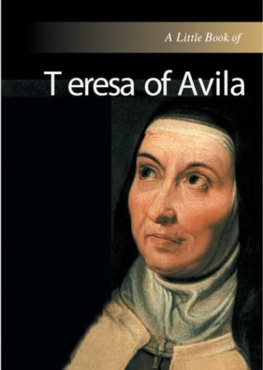
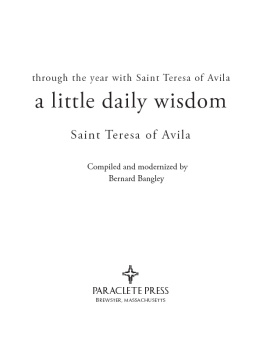
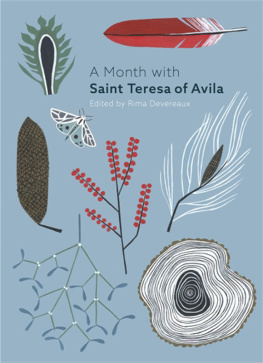


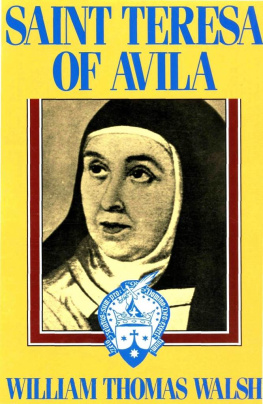

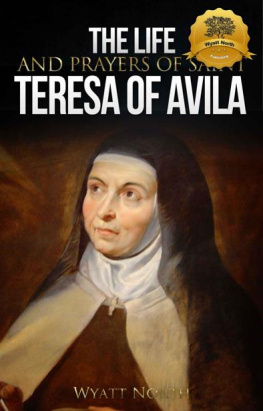
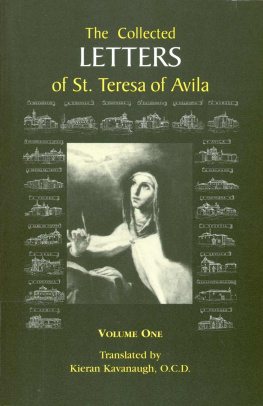
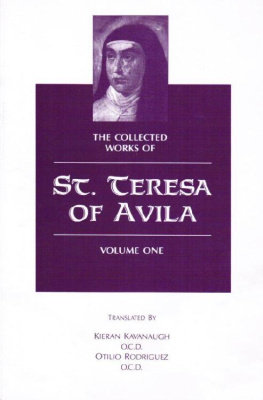
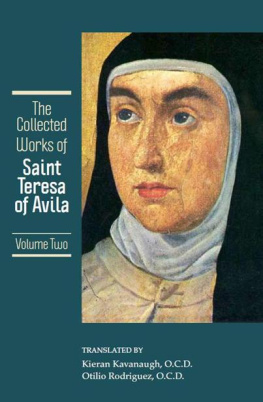
 A Little Book of St Teresa of AvilaCompiled and introduced by Don Mullan
A Little Book of St Teresa of AvilaCompiled and introduced by Don Mullan First published in 2003 by
First published in 2003 by  55A Spruce Avenue, Stillorgan Industrial Park, Blackrock, Co Dublin Designed by Bill Bolger Origination by The Columba Press Printed in Ireland by Betaprint, Dublin ISBN 1 85607 425 0 Compilation copyright 2003, Don Mullan
55A Spruce Avenue, Stillorgan Industrial Park, Blackrock, Co Dublin Designed by Bill Bolger Origination by The Columba Press Printed in Ireland by Betaprint, Dublin ISBN 1 85607 425 0 Compilation copyright 2003, Don Mullan